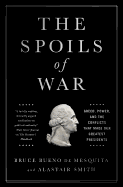
In The Spoils of War, New York University historians Bruce Bueno de Mesquita and Alastair Smith codify their thesis when they write about Franklin Roosevelt and World War II, "Like most successful politicians, Roosevelt was willing to risk long-term disaster... for America to avoid short-term political defeat." It's an unpopular view of Roosevelt, who is largely seen as a fearless wartime leader, but it's a perspective they apply equally to some of the United States' most popular presidents.
They explore the executive decisions that led to some of the country's most definitive foreign and domestic conflicts. Their claim throughout is that while every president may have had genuinely altruistic motivations for involving the country in war, there were always ulterior motives that benefited their own political or personal ambitions.
Mesquita and Smith endeavor to redefine and deconstruct the heroic mythology surrounding some of the country's most celebrated wartime presidents. They explain that, due to American history's tendency to romanticize its historic leaders, the true causes of war are often shrouded.
The approachable and detailed historical context Mesquita and Smith provide is enlightening and effective. They assert, with operative facts and concise language, George Washington's duplicity in advocating for a war with the Crown not, as is believed, for independence but rather for access to fur-trapping territory. They argue that Lincoln's Civil War was built on a political strategy not to ensure abolition so much as to drive a wedge through a southern, anti-Republican voting block.
The Spoils of War demonstrates that, while history smiles upon its wartime leaders, the facts can be far less kind. --Josh Potter

